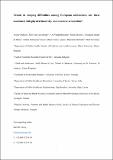Trends in sleeping difficulties among European adolescents : are these associated with physical inactivity and excessive screen time?
Abstract
Objectives We examined changes in sleep-onset difficulties over time and associations with physical activity and screen time behavior among adolescents. Methods We used data from last four survey waves of the Health Behavior in School-Aged Children (HBSC) study (2002–2006–2010–2014). Multilevel logistic regression analyses were conducted to explore associations between regular sleeping difficulties, excessive screen time exposure and being insufficiently physically active (i.e., < 60 min daily) among 33 European and non-European countries. Results Findings indicate an increase in the prevalence of sleep-onset difficulties and in excessive screen time exposure and a small but significant increase in physical activity levels. Additionally, adolescents exceeding 2-h daily screen time had 20% higher odds of reporting sleep-onset difficulties, while no association was found for physical activity. The strength of the association between screen time and sleep-onset difficulties increased over time, which may reflect a change in type of screen time use (e.g., the increased use of easy accessible screens such as smartphones and tablets). Conclusions Effective strategies to reduce screen time are key to reverse the detrimental trend in sleep-onset difficulties among adolescents.
Citation
Ghekiere , A , Van Cauwenberg , J , Vandendriessche , A , Inchley , J , Gaspar de Matos , M , Borraccino , A , Gobina , I , Tynjälä , J , Deforche , B & De Clercq , B 2019 , ' Trends in sleeping difficulties among European adolescents : are these associated with physical inactivity and excessive screen time? ' , International Journal of Public Health , vol. 64 , no. 4 , pp. 487–498 . https://doi.org/10.1007/s00038-018-1188-1
Publication
International Journal of Public Health
Status
Peer reviewed
ISSN
1661-8556Type
Journal article
Description
The study was funded by the government of Flanders (Grant No. GEO-1GDD2A-WT) and the Research Foundation Flanders (Grant No. 12I1117N).Collections
Items in the St Andrews Research Repository are protected by copyright, with all rights reserved, unless otherwise indicated.
Related items
Showing items related by title, author, creator and subject.
-
Effect of free medicine distribution on health care costs in Canada over 3 years : a secondary analysis of the CLEAN meds randomized clinical trial
Persaud, Nav; Bedard, Michael; Boozary, Andrew; Glazier, Richard H; Gomes, Tara; Hwang, Stephen W; Jüni, Peter; Law, Michael R; Mamdani, Muhammad; Manns, Braden; Martin, Danielle; Morgan, Steven G; Oh, Paul; Pinto, Andrew D; Shah, Baiju R; Sullivan, Frank; Umali, Norman; Thorpe, Kevin E; Tu, Karen; Wu, Fangyun; Laupacis, Andreas; CLEAN Meds study team (2023-05-26) - Journal articleIMPORTANCE : Few interventions are proven to reduce total health care costs, and addressing cost-related nonadherence has the potential to do so. OBJECTIVE : To determine the effect of eliminating out-of-pocket medication ... -
Pädiatrische versorgungskonzepte in Europa
Weber, Martin W; Backhaus, Sophia; Chukwujama, Obiora; Fenski, Friederike; Henking, Christoph; Schatte, Laura; Aleman-Diaz, Aixa Y (2018-01-19) - Journal articleTo promote children’s health in Europe, the World Health Organization (WHO) developed the European child and adolescent health strategy 2015–2020, which is supported and will be implemented by all Member States (MS). In ... -
Arts-based approaches to promoting health in sub-Saharan Africa : a scoping review
Bunn, Christopher; Kalinga, Chisomo; Mtema, Otiyela; Abdulla, Sharifa; DIllip, Angel; Lwanda, John; Mtenga, Sally M.; Sharp, Jo; Strachan, Zoë; Gray, Cindy M. (2020-05-21) - Journal itemIntroduction Arts-based approaches to health promotion have been used widely across sub-Saharan Africa (SSA), particularly in public health responses to HIV/AIDS. Such approaches draw on deep-rooted historical traditions ...

